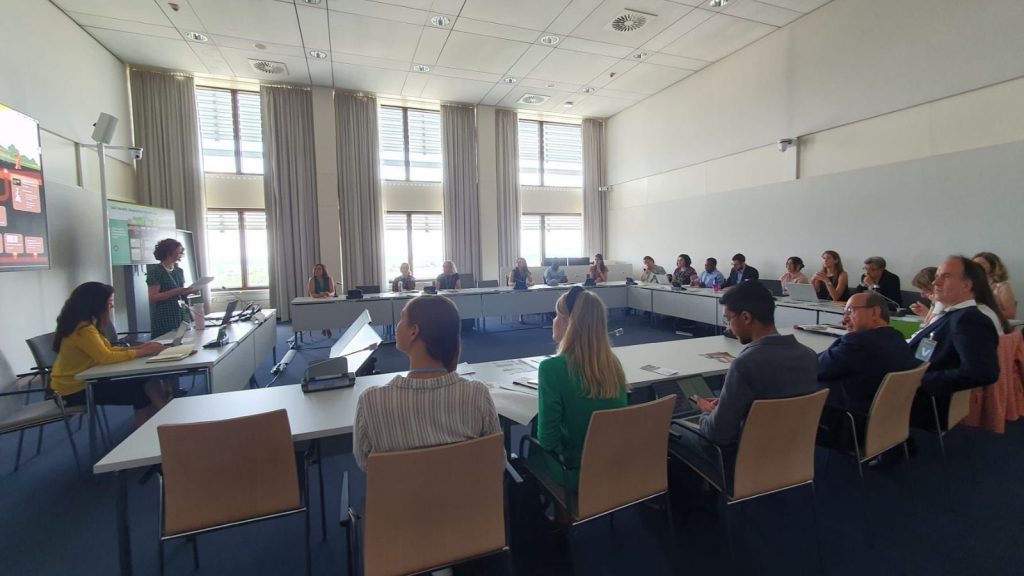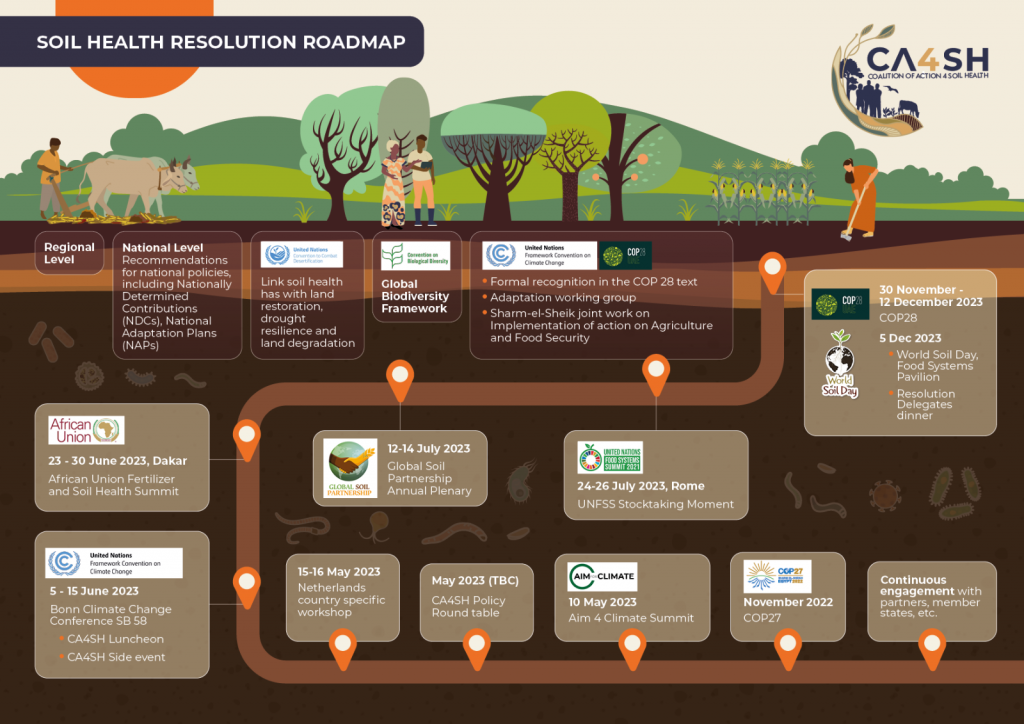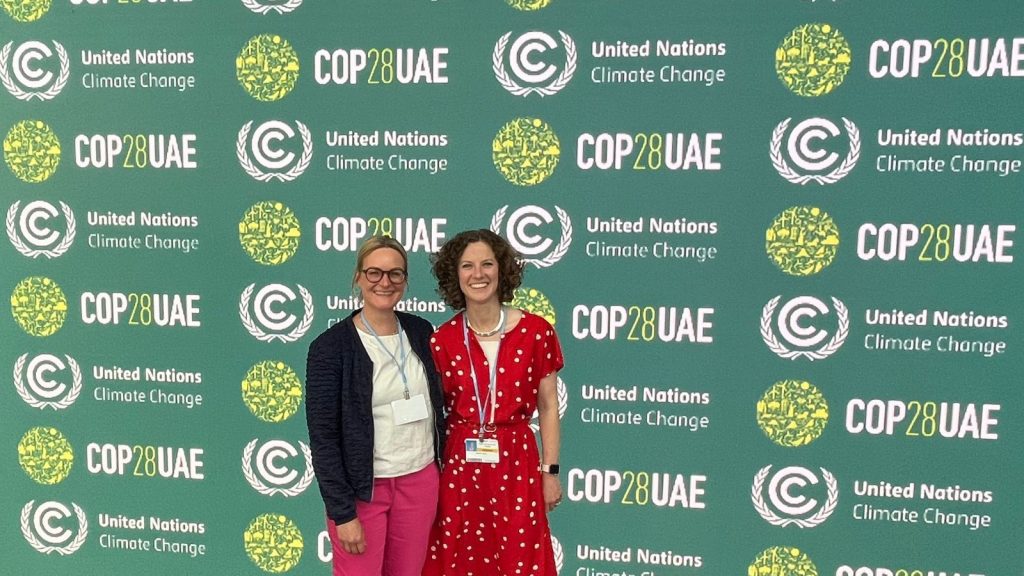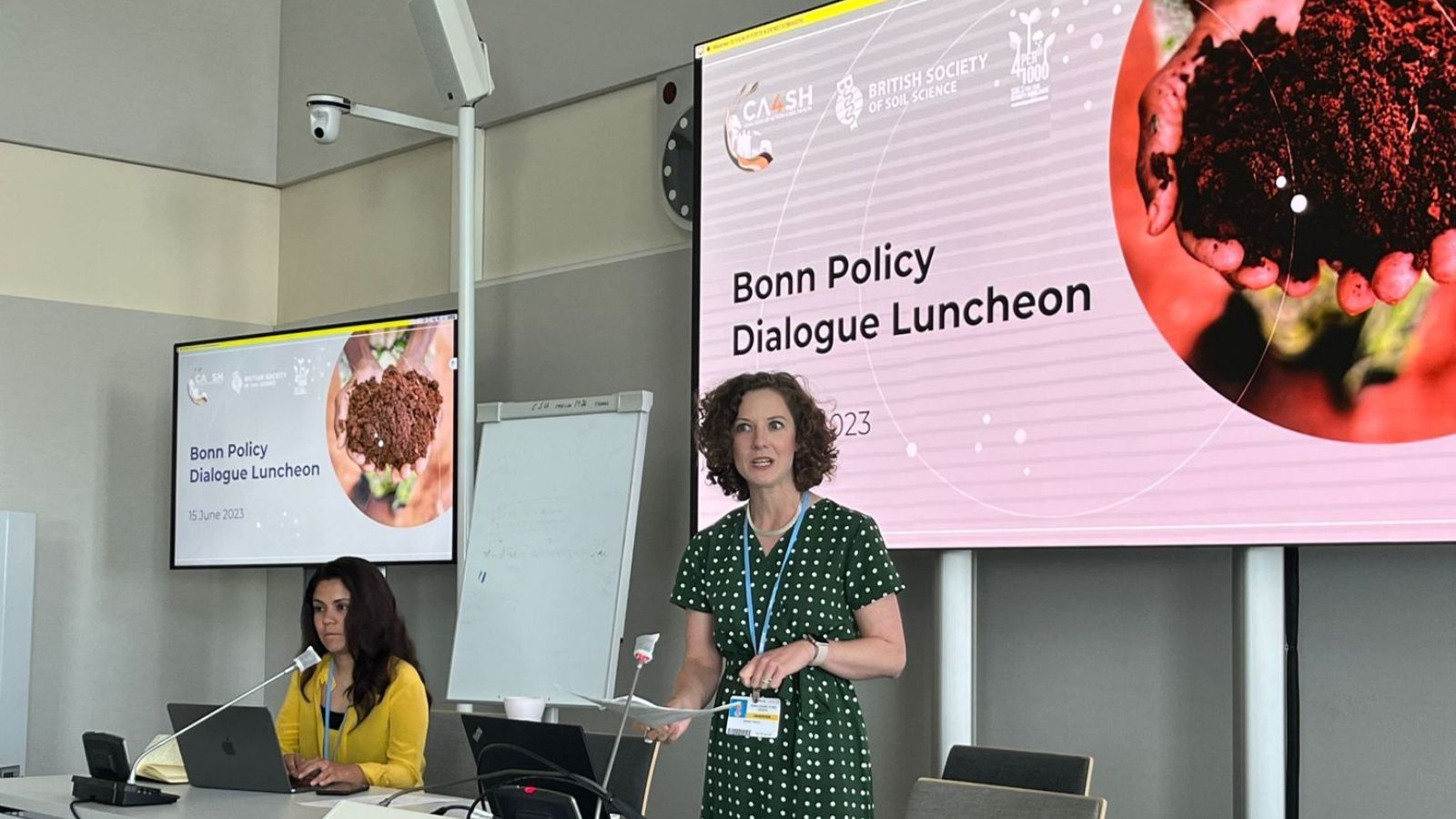Bonn Climate Change Conference SB58 – Building a Roadmap for Soil Health in the Climate Change Agenda
During the Bonn Climate Change Conference in June, we were delighted to co-host a policy dialogue session with the Coalition of Action 4 Soil Health (CA4SH) and the International “4 per 1000” initiative.
Our session obviously focused on soil. The often-unsung hero, which can help international governments meet their mitigation and offset targets, but which does not share the same legal protections as air and water.
The British Society of Soil Science is part of CA4SH: a coalition of over 130 organisations from government, scientific organisations, NGOs and the private sector. CA4SH members recognise the positive impact which actions such as scaling sustainable soil management practices could have for our soil, the wider environment and climate change and that nature-based solutions can make an essential contribution to combatting climate change.
According to CA4SH, the widescale adoption of sustainable soil management practices will lead to the mitigation of upwards of 1.8 Gt of carbon per year from 2030, comparable to the mitigation amount from wind energy, and sustainable soil management practices, alongside other interventions, will also prevent some of the 24 billion tonnes of topsoil lost each year.
Human intervention has also led to the desertification of soils in some areas of the world and we have all seen the impact which political instability and conflict has had on our ability to farm in nutrient-rich soils. Our session focused on the need for urgent intervention at a global scale, to prevent further degradation of our soils, allow us to support the ever-growing human population and to meet our climate change targets.

Today’s session highlighted excellent case studies from Aapresid (Argentine No Till Farmers Association), the Welsh Government and Australian Government on how local approaches could help us achieve change on a global scale.
The movement for global soil health is building momentum and we have the opportunity to integrate both soil health and climate change monitoring and reporting, to meet dual aims. However to action real, systemic change, we need accountability.
BSSS President, Dr Jack Hannam, highlighted that there is no overarching strategy for soils in the UK and this needs to be addressed. On the subject of carbon, peatlands in the UK store 3.2 billion tonnes carbon. However, only 20% of peatlands are in a natural state in the UK. This means the majority of peatlands in the UK are no longer a sink, but a source of carbon emissions. They release 23 million tonnes of Co2 equivalent each year. To address this, peatland action plans have been produced in the UK in 2021 (England), 2020 (Wales), 2015 (Scotland), with Scotland committing to ensuring all peatlands are in a good condition by 2030. Ultimately a co-production of policy is needed between researchers, environmental NGOs and farmers in order to break down silos.
In her overview at our event, Miriam Medel, Chief of External Relations, Policy and Advocacy at the UN Convention to Combat Desertification (UNCCD) highlighted three key priorities to improve soils’ visibility:
Overcome segmentation and silo’d working
Soils are integral to many UN workstreams, including the UNCCD, the UN Framework Convention on Climate Change (UNFCCC) and the UN Food and Agriculture Organization (UNFAO). To effect real change we must bring these and other stakeholders together to agree how soils underpin these workstreams.
Promote investment in soil health
Parliamentarians, society and consumers must understand the impact of good soil health. Without this understanding, we will not gain buy-in.
Promote inclusion
Although policymakers can agree legislation and protections for soils, the ‘on the ground’ solutions should be agreed by local stakeholders. One solution will not fit all.
Claudia Schlepp from the 4per1000 Initiative provided the closing remarks at the event:
“The last IPCC report made it clear, that besides all efforts to reduce our green house gas emissions, we need to remove carbon from the atmosphere in order to still be able to limit global warming to well below 2°C. At the same time, we need to feed a growing population and we need to be more resilient to the impacts of climate change. What we wanted to stress here, is that healthy soils can be a major lever to address all the issues at once. But, without sustainable management, they can also aggravate the situation substantially. We therefore need to make sure, that increasing soil health is considered in our global ambition to fight climate change and that it is recognized as a central and integrating lever to reach the goals of all three Rio conventions. We need to make sure, that farmers can economically afford to cultivate their land sustainably, that they have access to information and advise from extension services and that these are knowledgeable in regenerative farming practices. The 4per1000 Initiative, the CA4SH coalition and the British Society of Soil Science stand ready to support you in this process.”

In the lead up to COP 28 in Dubai in November/ December 2023, we will continue to focus on our members’ evidence. We will shortly be publishing the first document in our Land Use for Net Zero series: a Monitoring, Reporting and Verification (MRV) guidance note, to help farmers and landowners navigate the carbon credits market. With more guidance to come, this evidence will help us to provide international negotiators, policy makers and farmers with the tools they need to support soil health alongside each other: in policy negotiations and in action on the land.
 Sarah Garry, Executive Officer and Jack Hannam, President attended SB58 in Bonn where the British Society of Soil Science co-hosted Building a Roadmap for Soil Health in the Climate Change Agenda, with the Coalition of Action 4 Soil Health and the International 4 per 1,000 Initiative on Thursday 15 June.
Sarah Garry, Executive Officer and Jack Hannam, President attended SB58 in Bonn where the British Society of Soil Science co-hosted Building a Roadmap for Soil Health in the Climate Change Agenda, with the Coalition of Action 4 Soil Health and the International 4 per 1,000 Initiative on Thursday 15 June.





